Happy New Year

The Compass will be taking a brief end-of-year hiatus and will resume Monday. Happy New Years and thanks for reading!
(AP Photo)
« November 2010 | Blog Home Page | January 2011 »

The Compass will be taking a brief end-of-year hiatus and will resume Monday. Happy New Years and thanks for reading!
(AP Photo)
A new report from Iraq Body Count notes that 3,976 Iraqi civilians were killed in 2010, down from 4,680 the year before. The study's authors note that the 2010 toll "showed the smallest year-on-year reduction (proportionally as well as in absolute terms) since violence levels began to reduce from late 2007 onwards: 2008 reduced deaths by 63% on 2007, 2009 by 50% on 2008, but 2010 only improved by 15% on 2009."
The U.S. role in Iraqi civilian death is low, according to the study. There were 32 reported Iraqi civilian deaths by U.S.-led coalition forces in 2010, down from 64 in 2009. Insurgents and al-Qaeda in Iraq, collectively dubbed 'anti-occupation forces' by the study's authors, were responsible for the majority of the carnage.
Since the war began, Iraq Body Count estimates that 151,971 Iraqis have been killed, including civilians, Iraqi soldiers and insurgents.
While the reduction in civilian deaths is welcome, there was a statistic that jumped out at me:
2010 averaged nearly two explosions a day by non-state forces that caused civilian deaths (675 explosions killing 2,605).
Many well-established democracies have endured prolonged bouts of terrorism and bombing (Britain comes to mind), but Iraq has no recent democratic pedigree and no strong democratic institutions to speak of. The Middle East is replete with states with powerful internal security apparatuses - and Iraq, if only out of sheer necessity - will need strong internal security services to govern. That does not speak well for the country's democratic prospects.
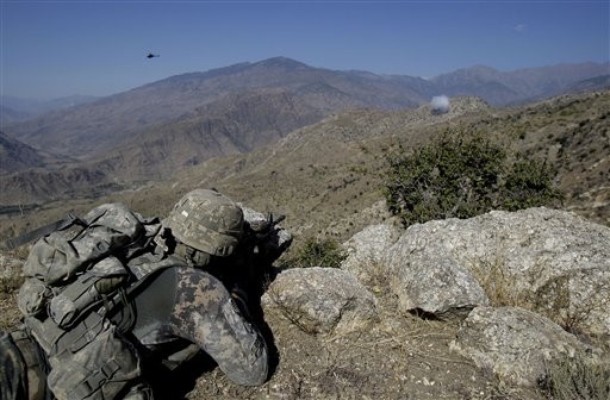
Anatol Lieven makes a good point here:
However, if American generals genuinely want to increase such raids, then it needs to be stated emphatically that this is not just a lunatic idea, but one that demonstrates how far senior American (and British) commanders have become obsessed with the war in Afghanistan at the expense of the struggle against terrorism as a whole.
If I told you that Country X was involved in a low level civil war and that some al-Qaeda members were aiding, and indeed cooperating with, rebel factions, would the proper U.S. policy response be to invade and occupy the country with 100,000 troops, plus thousands of NATO soldiers and an aid effort that eclipsed the Marshall Plan? Probably not. It's true that the U.S. does not have the luxury of starting from square one in Afghanistan, but if the goal is to protect the American homeland from a terror attack at a reasonable cost in blood and treasure, then you really do have to question the scope of the current U.S. commitment to Afghanistan.
(AP Photo)
Here's a look at some of the numbers behind 2010:
27,000: The number of suspected drug gang members arrested in Mexico
12,000: The number of people murdered in Mexico as part of the country's drug war.
57: The number of reporters killed around the world.
708: The number of coalition forces killed in Afghanistan.
1,550: The number of strategic nuclear warheads the U.S. and Russia will be allowed to maintain under the terms of the New START treaty.
985: The estimated number of people killed by U.S. drone strikes in Pakistan in 2010.
222,000,000,000: The cost, in U.S. dollars, of economic losses from both man-made and natural disasters.
260,000: The approximate number of people killed by severe catastrophes.
Mark Goldberg on why the post-election standoff in Ivory Coast matters:
Since the end of the Cold War, elections have been de rigeur in most of Africa. Most of the time the incumbent or his party wins handily and that’s that. Other times, the incumbent uses violence to reinforce his position. Sometimes challengers use violence to reinforce their position. But only once has an incumbent peacefully transferred power after losing an election.What is remarkable about Cote D’Ivoire is that, so far, everyone is saying: “Enough is enough.” The African Union, the regional group ECOWAS, the UN, France and the United States are calling on Gbagbo to step down. Full stop. ECOWAS has even issued an ultimatum to Gbagbo: give up power, or we will intervene and forcible oust you.
This is a big test — both for the prospects of free and fair elections in Africa and of the ability of the African Union to support democracy across the continent. If African-led diplomacy is able to engineer Gbagbo’s ouster, other leaders might think twice before fomenting violence after losing an election.
A new poll from Angus Reid (pdf) finds that over two thirds of Americans think Iran is pursuing a nuclear weapon but only a quarter of those polled believe military force is warranted to stop them. Not surprisingly, Iran ranks as Americans' "least favorite" country when given a choice of 12 other nations, including Axis of Evil counterpart North Korea. Among the poll's other findings:
Despite these strong negative feelings and suspicions, Americans are still not in favor of any type of military engagement or intervention with Iran. In fact, the most frequent option Americans recommend to deal with Iran is engaging in diplomatic negotiations (30%, up slightly from 26% in January 2010), followed by economic sanctions (20%). Only five per cent of respondents would do nothing, claiming that Iran poses no threat to the world.Across the country, 16 per cent of Americans would consent to launching military strikes to destroy Iran’s nuclear facilities, and seven per cent would authorize a full-scale invasion of Iran and removing the current government.
There are some striking differences when party allegiance is taken into consideration. More than half of Democrats would rely on negotiations and sanctions to deal with Iran (56%), while two-in-five Republicans (40%) would prefer to launch strikes or authorize an invasion. Independents are more likely to choose diplomacy and sanctions (52%) than air strikes or an invasion (19%).
A new report on human rights from the risk consulting firm Maplecroft finds backsliding in China:
Most significantly for business, given it plays a major role in supply chains, China has fallen two places in the ranking from last year to 10th. China joins DR Congo (1), Somalia (2), Pakistan (3), Sudan (4), Myanmar (5), Chad (6), Afghanistan (7), Zimbabwe (8), and North Korea (9) as the countries with the worst human rights records.Russia (14), Colombia (15), Bangladesh (16), Nigeria (17) India (21), Philippines (25) and Mexico (26) have also seen their scores worsen and are featured in the ‘extreme risk’ category.
Interestingly, the report also singles out India for criticism:
India, which is important to the ICT, manufacturing and agriculture sectors, performs particularly badly in the area of labour rights protections. It is ranked joint first for child labour, forced labour and discrimination and 7th for trafficking, which includes the use of girls in bonded labour and sexual exploitation. Estimates of the number of child labourers varied widely. The government's 2004 national survey estimated the number of working children from aged 5-14 at 16.4 million. NGOs, however, claimed the number of child labourers was closer to 55 million.
China announced yesterday that it would cut its rare earth mineral export quota in 2011, following steep reductions in 2010. While the move is sure to deliver some short-term pain to industries in Asia, Europe and the U.S., it has been a boon for Australia:
Australia's emerging rare earths producers and explorers are enjoying a year-end surge in value thanks to China's latest move to limit supplies from its dominant industry to the rest of the world....According to the US Geological Survey, rare earths are relatively common within Earth's crust but, because of their geochemical properties, are not often found in economically exploitable concentrations. It said new mines in Australia, the resumption of a big mine in the US, and the possible development of other deposits there and in Canada ''could help meet increasing demand''.
As Ian MacKinnon reports, the international scramble to shore up new sources of supply is creating some uncomfortable bedfellows - such as a tie-up between South Korea and Burma.
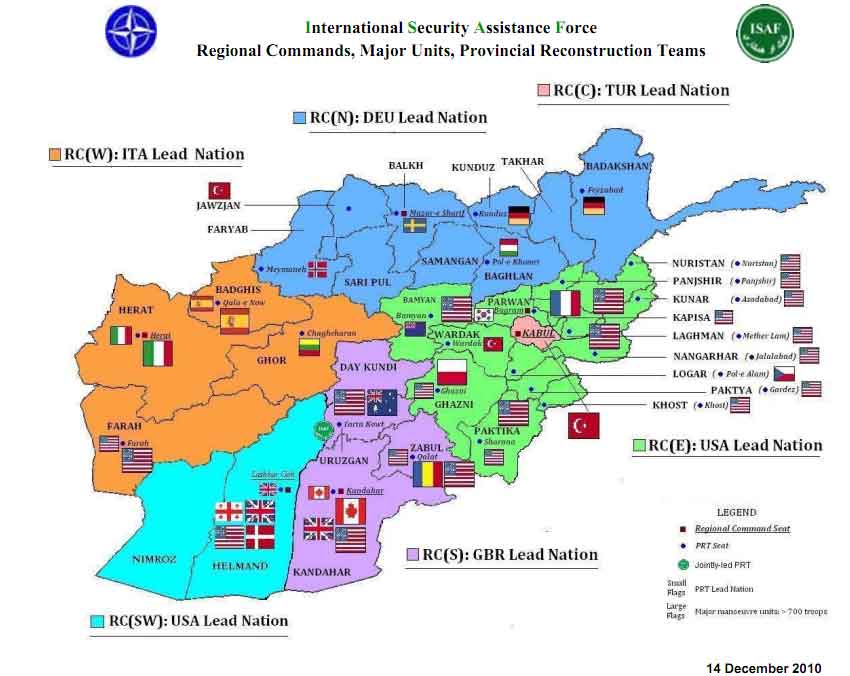
NATO recently released an updated map showing the distribution of coalition forces in Afghanistan.
In an interview with the Wall Street Journal, Iraqi Prime Minister Nouri al-Maliki said he wants U.S. troops out of the country on schedule:
But Mr. Maliki said the only way for any of the remaining 50,000 or so American soldiers to stay beyond 2011 would be for the two nations to negotiate—with the approval of Iraq's Parliament—a new Status of Forces Agreement, or SOFA, similar to the one concluded in 2008.That deal took a year of protracted negotiations in the face of vehement opposition from many among Mr. Maliki's own Shiite constituency, and no repeat is expected.
Mr. Maliki and U.S. officials have refrained for the most part from raising the issue publicly during the months of political wrangling in Baghdad, as Mr. Maliki negotiated with potential coalition partners, many of whom have adamantly opposed an extended U.S. stay.
A senior official in President Barack Obama's administration said Washington was "on track" to withdraw all its remaining soldiers in Iraq by the end of next year. That's the final milestone in the security agreement, following the reduction in American troop levels to below 50,000 in August and the pullout of U.S. soldiers from most Iraqi inner cities in June 2009. "The prime minister is exactly right," said the senior official.
During the interview, Mr. Maliki said he was heartened by America's "commitment" to honoring the agreements it reached with Iraq, and he laughed approvingly when told that U.S. Ambassador James F. Jeffrey keeps a frayed copy of the so-called Strategic Framework Agreement in his leather briefcase.
Max Boot is worried:
If such a wholesale departure of U.S. troops does occur, Iraq will face stiff challenges. It may very well surmount those obstacles, but I would be more confident in its future, as I have said before, if there were a substantial and longterm American presence just as there has been in Germany, Japan, and South Korea.
The trouble is, unlike Germany, South Korea and Japan, Iraq has waged a fierce insurgency to eject U.S. forces. And, unlike Germany, South Korea and Japan, America's security presence isn't simply to keep rival nation states at bay, but to help shore up Iraq's internal security.
We may know better than Maliki what is required to protect his country - and clearly Boot is right that Iraq is extremely fragile right now - but the insistence on replacing Saddam's tyranny with what is ostensibly a democracy carried with it the obvious risk that the democratic wishes of a sovereign Iraq would not align with the neoconservative vision of stationing U.S. troops inside the country for half a century.
Now that the New START debate is over, attention turns to what's next in U.S.-Russian relations. While it appears the Obama administration will work on limiting shorter-range arms, conservatives want to focus on how Russia is ruled. Here's Robert Kagan:
Relations with Moscow are about to grow more challenging. This is partly because some of the easy pickings - including this treaty - have already been harvested. The problems that lie ahead are going to be a tougher test of the reset: what to do about Russia's continued illegal occupation of Georgia; how to handle Russia's increasingly authoritarian domestic behavior, its brutal treatment of internal dissent and its squelching of all democratic institutions.
Jennifer Rubin thinks the conviction of oil tycoon Mikhail Khodorkovsky indicates the reset was "mostly spin."
I'm not sure why we're defining the "reset" as somehow hinging on whether the United States can successfully change the internal politics of Russia - as ugly as they unquestionably are. As I understood it, the goal was to improve U.S.-Russian relations and advance, to the extent possible, American interests in areas where Russia also wielded influence.
It's also not quite clear to me how the United States can go about changing Russia's political institutions (have public figures whine loudly about them?) or why such a complex and ill-defined effort should be the key priority going forward.
Reuel Marc Gerecht and Mark Dubowitz think so, arguing that containment is a "regime change" strategy:
Political and economic isolation is designed to nurture Iran’s convulsive internal contradictions, vividly on display after the June 12, 2009, elections. The contentious issue in Iran policy isn’t the goal—do we want Khamenei and his Revolutionary Guards to fall? Democrats and Republicans differ on this far less than they did when President George W. Bush saw an “axis of evil.” The issue is timing: Can we put enough pressure on Khamenei and his praetorians to either crack the regime or make the supreme leader believe that the nuclear program actually threatens his rule?
I'm not sure that's correct. Let's say we achieve the second goal - convince the supreme leader that the nuclear program threatens his rule. Presumably that means that he gives the nuclear program up. At that point, American policy is satisfied. Of course, there will be plenty of neoconservatives who won't be happy until American troops liberate Tehran, but for all intents and purposes, convincing Khamenei to verifiably abandon the pursuit of a nuclear weapon would be enough for most people.

Another presidency, another push for the release of spy Jonathan Pollard. Presidents Clinton, Bush and Obama have ignored the entreaties over the years, and I have a hard time seeing why this situation is any different. The current boomlet for Pollard is being advanced by a collection of respectable people - Jennifer Rubin at the Washington Post, former George W. Bush Attorney General Michael Mukasey and of course Prime Minister Benjamin Netanyahu - but it seems to have little basis in any actual changed information on Pollard's espionage activities in the service of Israel, South Africa and Pakistan.
Martin Peretz, who exists as a figure of permanent controversy (and loving every minute of it!), has come out solidly against the idea of release, writing that President Obama would be "encouraging the kind of ideological blackmail" that we have seen in Middle Eastern politics for decades. Peretz maintains that supporters of Pollard are unintentionally giving Obama an opportunity to offer a small victory to Israel's right wing in exchange for "squeez[ing] Israel on its real security interests which are to guarantee a peace with the Palestinians who do not really want peace."
This may or may not be true. But what is true is that Pollard handed over to Israel secrets which were traded to, or otherwise obtained by, the Soviet Union. As former FBI and Navy lawyer M.E. Bowman writes at the U.S. Intelligence Studies journal Intelligencer, in a piece anyone advocating for Pollard's release really ought to read, Pollard leaked "the daily report from the Navy’s Sixth Fleet Ocean Surveillance Information Facility (FOSIF) in Rota, Spain, a top-secret document filed every morning reporting all that had occurred in the Middle East during the previous twenty-four hours, as recorded by the NSA’s most sophisticated monitoring devices." He also handed over "the TOP SECRET NSA RAISIN manual which lists the physical parameters of every known signal, notes how we collect signals around the world, and lists all the known communications links then used by the Soviet Union."
Typically, this sort of verified espionage ends the conversation about clemency of any kind. So why does Pollard keep popping up as a candidate for such consideration? Bowman leads off his piece by addressing the question of why Pollard's defenders have received so little in terms of public push back:
There have been few rebuttals of this escalation of calls for Pollard’s release. Mainly because so few were cognizant of the scope of Pollard’s disclosures, or the misuses of those disclosures, and the damage they did to our own operations and sources; and even fewer, of the policy implications of these unauthorized releases to a foreign power. Finally, when a plea agreement was reached, it was no longer necessary to litigate issues that could have exposed the scope of Pollard’s treachery – and the exposure of classified systems.
This explanation makes sense. Of course, it will do little to stop the push by Pollard's supporters. Let's see if Obama will ignore them, as Bowman advises, or if he'll use the opportunity to his advantage, as Peretz fears.
(AP Photo)
Thomas Joscelyn does a keyword search through 34 translated speeches:
To illustrate this point, consider the results of some basic keyword searches. Guantanamo is mentioned a mere 7 times in the 34 messages we reviewed. (Again, all 7 of those references appear in just 3 of the 34 messages.)By way of comparison, all of the following keywords are mentioned far more frequently: Israel/Israeli/Israelis (98 mentions), Jew/Jews (129), Zionist(s) (94), Palestine/Palestinian (200), Gaza (131), and Crusader(s) (322). (Note: Zionist is often paired with Crusader in al Qaeda’s rhetoric.)
Naturally, al Qaeda’s leaders also focus on the wars in Afghanistan (333 mentions) and Iraq (157). Pakistan (331), which is home to the jihadist hydra, is featured prominently, too. Al Qaeda has designs on each of these three nations and implores willing recruits to fight America and her allies there. Keywords related to other jihadist hotspots also feature more prominently than Gitmo, including Somalia (67 mentions), Yemen (18) and Chechnya (15).
Contrary to some expectations, it now appears that Najib Razak and the ruling Barisan Nasional authorities in Malaysia intend to hold off on the next election until the second quarter of 2011. Via Malaysian Insider:
Anwar has used his suspension as campaign fodder in several ceramahs around the country, saying it was related to snap polls that could be held as early as March 2011. Several other opposition leaders have also echoed his prediction.But Johor Baru MP Datuk Shahrir Samad hinted last week that the election will be held in the second quarter and said that Najib wanted to see more results from the policies that he had introduced before calling for an election.
“Thus, it (the general election) will not be held so soon, maybe it will be held in the later part of 2011 or even beyond that,” the former Domestic Trade and Consumer Affairs Minister told reporters.
In terms of timing, this would come as Anwar Ibrahim is finishing up his six month suspension from parliament.
They just might be, if this report from John Pomfret is any indication:
After years of trying, Chinese engineers still can't make a reliable engine for a military plane.The country's demands for weapons systems go much further. Chinese officials last month told Russian Defense Minister Anatoly E. Serdyukov that they may resume buying major Russian weapons systems after a several-year break. On their wish list are the Su-35 fighter, for a planned Chinese aircraft carrier; IL-476 military transport planes; IL-478 air refueling tankers and the S-400 air defense system, according to Russian news reports and weapons experts.
This persistent dependence on Russian arms suppliers demonstrates a central truth about the Chinese military: The bluster about the emergence of a superpower is undermined by national defense industries that can't produce what China needs. Although the United States is making changes in response to China's growing military power, experts and officials believe it will be years, if not decades, before China will be able to produce a much-feared ballistic missile capable of striking a warship or overcome weaknesses that keep it from projecting power far from its shores.
The report also pours some serious cold water on China's vaunted "anti-ship" missile:
But the challenge for China is that an anti-ship ballistic missile is extremely hard to make. The Russians worked on one for decades and failed. The United States never tried, preferring to rely on cruise missiles and attack submarines to do the job of threatening an opposing navy.U.S. satellites would detect an ASBM as soon as it was launched, providing a carrier enough warning to move several miles before the missile could reach its target. To hit a moving carrier, a U.S. government weapons specialist said, China's targeting systems would have to be "better than world-class."
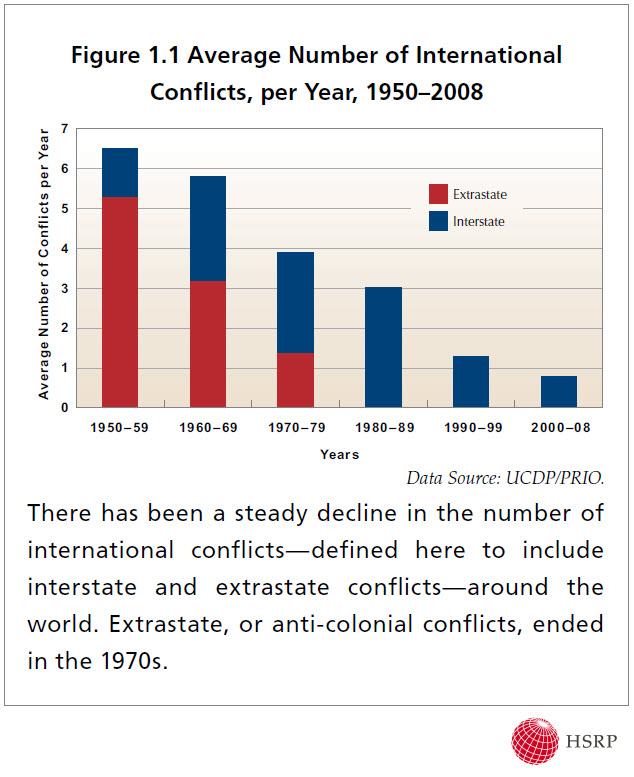
According to a new report from the Human Security Report Project, the number of deaths from armed conflicts around the world continues to fall, even while intercommunal wars have jumped and other conflicts have become increasingly difficult to bring to an end. What wars are fought are less lethal, too. "The average annual battle-death toll per conflict in the 1950s killed almost 10,000 people; in the new millennium the figure is less than 1,000," the report states.
Four of the world's five deadliest conflicts (Iraq, Afghanistan, Pakistan and Somalia) involve Islamists insurgents and, in some capacity, the United States. Although the report notes that: "The level of armed conflict in Muslim countries is far lower today than it was two decades ago, and support for al-Qaeda and other radical Islamist groups has declined substantially throughout the Muslim world."
So what's behind the move toward a more peaceful world? The authors take a stab at an explanation:
The demise of colonialism, the end of the Cold War, a dramatic increase in the number of democratic states, and a shift in elite attitudes towards warfare are among the key political changes that have reduced the incidence of international warfare since the end of World War II.Equally important, argues Professor Mack, has been the dramatic long-term increase in levels of global economic interdependence. “Interdependence,” he says, “has increased the costs of war while reducing its benefits.”
The decline in civil wars has rather different causes. Since the end of the Cold War, the UN-led upsurge of international efforts to negotiate peace agreements in ongoing conflicts and to prevent wars that have ended from starting again has been associated with a significant decline in the number of wars fought within states.
With the discovery of massive gas fields in the Mediterranean Sea, Batsheva Sobelman reports on the maneuvering of Israel, Cyprus, Turkey and Lebanon for maritime claims:
The deposits extend into areas controlled by Lebanon, and it has accused Israel of moving in on its natural resources. Not so, says Israel, which maintains that the fields lie between its territory and Cyprus. Israel's minister of national infrastructures, Uzi Landau, even said Israel would "not hesitate to use force" to protect the fields and uphold international maritime law.Then there's the Lebanese militia, Hezbollah. Israeli officials have expressed concern that gas rigs off its northern coast would make an attractive target for rockets and terrorist attacks.
Maritime borders are a fluid affair. There are several methods for calculating these in lieu of a direct bilateral agreement, which is not an option for Israel and Lebanon.
Israel had neglected to sort this out with Cyprus, which "owns" the other end of the Mediterranean. Now the two countries have divvied up the roughly 200 nautical miles between them and the maritime border was demarcated in a recent agreement signed in Nicosia by Cypriot Foreign Minister Markos Kyprianou and Landau. Israeli diplomats say the agreement should secure Israel's economic interests in the Mediterranean. Cyprus says this doesn't conflict with a similar agreement signed with Lebanon, still awaiting ratification in parliament.
Now Egypt is watching, to ensure the agreement doesn't infringe on Egyptian maritime territories and its interests. It too has signed a deal with Cyprus.
Agreement in the region is a short blanket; cover one side, and someone else's feet stick out. Now Turkey is angry.
The gas find is significant: Israel estimates it could boost the country's GDP by 4 or 5 percent in 2013.
One argument made by proponents of the U.S. foreign policy status quo is that absent a strong American presence in key regions of the world, democratic allies will wilt under the oppressive influence of autocratic powers. But if we have learned anything in 2010 is that precisely the opposite happens, at least in Asia. China's "assertive" behavior hasn't precipitated a bout of regional appeasement but has instead catalyzed regional states to bulk up their defenses. As Barbara Demick reports:
Chinese behavior in the South China Sea has reversed the alliances of the Vietnam War, with Hanoi now edging toward the United States as it seeks protection. Vietnam is investing in submarines and long-range combat aircraft because of dozens of incidents over the last year in which Chinese vessels have harassed its fishing and oil ships. China's territorial claim to 1 million square miles of the sea has also unnerved Malaysia, Indonesia and Singapore, pushing them closer to the U.S.
Japan, too, recently announced that its new defense strategy will not entail becoming a satellite state of communist China but instead will be revamped to reflect China's emergence. Arms purchases in Asia are on the rise.
None of this is to suggest that the U.S. should "disengage" from Asia. But it is a telling reminder that if the U.S. were to disengage from, say, Europe, the result wouldn't be the collapse of Western Civilization.
After highlighting how Iraqi women are protesting their current state of affairs and noting how such protests would be impossible in Saddam's Iraq, Abe Greenwald writes:
But that, in itself, serves as a sterling refutation of the Saddam nostalgiasts. Given the choice between a hopeless dictatorship and a flawed democracy, only moral simpletons would defend the former.
And he's right! But who's defending Saddam? None of the anti-Iraq-war arguments that I'm aware of (or that I'd endorse) centered around "the Iraqis don't know how good they have it under Saddam's boot." And I don't recall President Bush rallying the American people around the urgent need to sacrifice American blood and treasure so Iraqi women can more publicly protest their plight. One can recognize the gains made by the Iraqi people in the post-Saddam era without believing that those gains somehow justify invading the country.
Via Rasmussen:
A new Rasmussen Reports national telephone survey finds that only 27% of Likely U.S. Voters trust Russia to honor the nuclear weapons agreement. Half (49%) do not trust the Russians, and another 25% are not sure. That level of trust is consistent with results found in July and March.Still, 49% of voters wanted the Senate to confirm the nuclear weapons treaty. Thirty-seven percent (37%) think the treaty should have been rejected, while 15% are undecided.
A new report from the Institute for Science and International Security examines the impact of the Stuxnet computer virus on the centrifuges in Iran's Natanz facility. The authors conclude that there's some ambiguity with respect to just what the virus did, but they issue this warning:
For many years, governments have pursued methods to disrupt Iran’s ability to procure goods illegally overseas for its nuclear programs, particularly its gas centrifuge program. Such overt and covert disruption activities have had significant effect in slowing Iran’s centrifuge program, while causing minimal collateral damage. In contrast to overt military strikes, there is an appeal to cyber attacks aimed at a centrifuge plant built with illegally obtained, foreign equipment, and operating in defiance of United Nations Security Council resolutions. However, Stuxnet appears to have spread unintentionally and well beyond its targets. Part of the reason is in the design of Stuxnet, which needs to spread in order to increase its chance of infecting an industrial control system via a removable drive used with an infected computer. It is important for governments to approach the question of whether using a tool like Stuxnet could open the door to future national security risks or adversely and unintentionally affect U.S. allies. Countries hostile to the United States may feel justified in launching their own attacks against U.S. facilities, perhaps even using a modified Stuxnet code. Such an attack could shut down large portions of national power grids or other critical infrastructure using malware designed to target critical components inside a major system, causing a national emergency.
I think as long as the majority of the damage and havoc caused by Stuxnet is confined to Iran's facilities, the attack should be deemed a success. Putting time back on Iran's nuclear clock without having to court another war in the Middle East is all to the good. However, if the virus winds up causing major damage to other countries' nuclear infrastructure, then obviously the 'collateral damage' issue becomes much more significant.
A new poll finds that a majority of Japanese and Americans do not trust China:
The Gallup poll published Wednesday by the Yomiuri Shimbun was conducted among 1022 Japanese and 1002 Americans and showed that 87 percent of Japanese and 65 percent of Americans do not trust China....The poll found that Japanese people feel relations between Japan and the U.S. have been worsening due to the planned relocation of U.S. base in Okinawa. Some 40 percent of Japanese respondents said bilateral relations deteriorated, up from 26 percent last year. In contrast, the proportion of those who thought the two countries are on good terms fell from 48 percent last year to 33 percent this year.
Asked about the reasons, 79 percent of Japanese cited complications caused by the relocation plan.
Gallup has a new poll out gaging American attitudes toward exceptionalism:
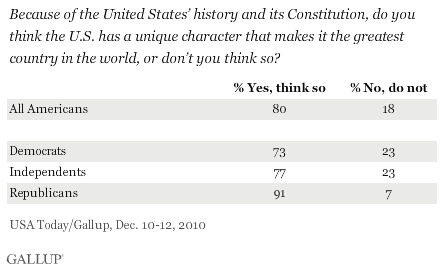
There are some other interesting data points as well:
Three-quarters of those who believe the U.S. is exceptional (62% of all Americans) also believe the U.S. is currently at risk of losing its unique character.The poll does not delve into possible reasons why Americans think the United States' stature is at risk....
One of the extensions of the belief in American exceptionalism is the notion that, because of its status, the United States has an obligation to be the leading nation in world affairs. Americans generally endorse this position, as 66% say the United States has "a special responsibility to be the leading nation in world affairs." Republicans, Democrats, and independents generally agree, with fairly modest differences among party supporters.

It's been an incredible week in Malaysian politics with Anwar Ibrahim's six month suspension from parliament, which prompted a walkout by supporters and resulted in "pandemonium" among members.
Anwar's position as opposition leader in Malaysia has been weakened, to say the least, over the past several months. The public relations damage of the departure of the respected Zaid Ibrahim, flagging poll numbers, growing attacks from the ruling Barisan Nasional coalition and other incidents have all contributed to sustained internal strife within the opposition groups.
Anwar's role at the center of this maelstrom took a new tone with the decision to levy this suspension. The background is fascinating and odd: essentially, Anwar claimed that the 1Malaysia slogan used by the ruling coalition (primarily to send a PR message of unity for an ethnically diverse nation) was devised as an imitation of a slogan used by Israel's Ehud Barak roughly a decade ago.
This prompted a series of paper-waving incidents, climaxing with this one by Nazri Abdul Aziz, who presented a letter from political adviser Bob Shrum (who created the Israeli campaign) as evidence to refute Anwar's claims.
Yet the question now becomes: is suspension really all that bad for Anwar? Will he be able to connect with his constituents as a weakened leader, or will they gather to his side as a martyr for the cause? He and his allies are currently fighting the matter in the courts, but that may be needlessly messy. For a political leader who has based much of his appeal on a degree of victimhood, some of it real and some not (we have those in America, too), this could turn out to be, as Joe Fernandez suggests, a blessing in disguise.
Of course, that may require a large degree of political patience, and only time will tell if that is something Anwar is willing to embrace. But one thing we know from history is that how politicians respond to censure (even politically motivated censure) by their peers can determine a great deal about the future of their careers.
(AP Photo)
While everyone else is focused on the Korean peninsula these days, James Kirchick's reports from the Belarus election deserve attention. Kirchick previewed the election by asking why the West is cozying up to Alexander Lukashenko:
Earlier this decade, Lukashenko’s abuses led the United States and the European Union to impose a series of targeted sanctions on regime officials, which led the Belarusian government to reconsider a handful of its draconian actions. The sanctions were effective, in large part, because the U.S. and its European allies presented a united front. After all, unilateral sanctions don’t have the same bite as those implemented by several countries. (See the painstaking effort of the Obama administration to convince governments around the world to get on board with sanctions against Iran.) But, over the past year, that erstwhile front against Belarus has cracked. The EU has dropped many of its sanctions, and European leaders have even begun cozying up to Lukashenko. Meanwhile, the United States, while maintaining sanctions, has done little to press the Belarusian president on his abysmal human rights record.Why has the West gone soft on Lukashenko? The answer, in fact, lies to the east: Belarus has increasingly become a pawn between Russia and Europe and the United States. And the winner of this geostrategic chess match has been the Belarusian dictator himself.
Last week, Lukashenko was re-elected to a five year term under controversial circumstances and a government crackdown on protests. Kirchick describes the scene:
A column of spetsnaz stormed past me, throwing an elderly man to the ground and beating people—all of them unarmed—mercilessly. Presidential candidate Vital Rymasheuski staggered past me assisted by supporters, his hands covering a bloody gash on his forehead. I witnessed one police officer repeatedly club a person who was trapped against a wall. The sound of truncheons slapping plastic shields was the clear signal that unrelenting violence was only a few seconds away—and that one should run.
Six opposition candidates were arrested by the authorities, and Lukashenko is now set to be the head of state for a full 21 years - essentially, president for life. Shouldn't the United States care about this? Should the U.S. remain silent simply as payback for the Belarus commitment to give up Uranium stores? Is this really worth any diplomatic utility gained by using him as a pawn against Russia?
Thomas Barnett reposts maps produced by the Center for Strategic and Budgetary Assessment detailing all the areas inside China that the U.S. would want to bomb in the event of hostilities over Taiwan. Barnett:
If somebody publishes maps of the U.S. delineating all the places they'd want to bomb on the first day of the war . . . I'd take that kinda personally. No, I'm not naive enough to believe the Chinese don't have theirs. But it takes a certain chutzpah to publish yours so openly while decrying Chinese "provocations" and "throwing their weight around." China hasn't waged war in a very long time. The U.S. does so regularly. Whose maps should we take more seriously?
This gets to the nub of one of the odder complaints the Pentagon makes about China's military build-up - its "lack of transparency." Would we feel better about China if they came out and said, ala the U.S., that they're developing their military capability so that they can blow up our carrier battle groups?
Ever since it was announced, UK commentators have been wondering how long Britain's coalition government could last. Now it's undergoing one of its higher-profile dust-ups after Vince Cable, the Business Secretary (and a Liberal Democratic) told undercover reporters that he had 'declared war' on media magnate Rupert Murdoch. This is not the first time Cable has put his foot in it, as the AP notes:
Earlier, Cable apologized for saying he could bring down the government if pushed and claiming public sector reforms risked running out of control.He told the journalists that that "I have a nuclear option ... If they push me too far then I can walk out and bring the government down."
Cable's Liberal Democrat party is junior partner to the Conservatives in Britain's coalition government. Before the election Cable was strongly critical of many economic policies his government now endorses as it seeks to cut public spending and slash the country's deficit.
Cable told the reporters that his desire for a tough approach to the banks, which precipitated the financial crisis, had been opposed by "our Conservative friends."
He likened the planned reforms to health care and local government to a "Maoist revolution ... which is in danger of getting out of control."
Police say they have arrested a farmer on the edge of France's fabled Provence region who fatally shot a trespasser he suspected of trying to steal highly coveted truffles.The 32-year-old farmer told police he was guarding his truffle patch in the town of Grignan when he was frightened by the intruder and shot him in the legs and head with a hunting rifle.
The Times of India reports on America's earlier effort to curtail nuclear proliferation:
Despite a persistent anxiety over its nuclear programme, the Carter administration failed miserably in efforts to pressurise Pakistan away from fuel enrichment and officials were left "scratching their heads" on how to tackle the problem, newly declassified documents have shown.The recently declassified US government documents from the Jimmy Carter administration, published on the Internet today by the National Security Archive shed light on the critical period in the late 1970s when US first became aware of Pakistan's nuclear intentions.
The documents show that Pakistani nuclear weapons programme had been a source of anxiety for American policymakers ever since the late 1970s when Washington discovered that metallurgist A Q Khan had stolen blueprints for a gas centrifuge uranium enrichment facility.
Washington will probably prove equally ineffectual when it comes to stopping Iran's nuclear program.
Paul Miller puts Afghanistan into perspective:
The missing ingredient is more civilian aid. Secretary Clinton touted that the U.S. mission in Kabul now comprises some 1,100 diplomats and civilian experts, which roughly doubles or triples the presence we had prior to 2009. Add together all the soldiers serving on Provincial Reconstruction Teams (PRTs) and you have several thousand more. This is still not enough. At its peak, the Allies deployed something like 63,000 people who were directly engaged with rebuilding the government and economy of West Germany after World War II. I know the cases are hardly comparable for a thousand reasons -- but most points of difference say that rebuilding Afghanistan is harder than West Germany, and so it likely needs more help, not less. All the biggest remaining challenges in Afghanistan that we have not moved to address in the last year or so -- corruption, institutional weakness, poor governance -- are civilian, not military in nature. More civilians would be the gamechanger that could change Afghanistan from a half-baked muddle-through to an outright success.Afghanistan is winnable. We're almost there. The president's policy has many decent elements to it. But it is being sold under a stale, worn, and out-of-date headline and a poor strategic communications strategy. And it does not recognize the depth of Afghanistan's need for civilian assistance. Change that, and we will be able to look back with pride on what the United States and our allies helped achieve in Afghanistan.
Comparing Afghanistan to post-war Germany only underscores the massive difference in stakes between the two efforts. A failure to rebuild Germany after World War II would have had serious repercussions in Europe, and vis-a-vis the Soviet Union. A failure to rebuild Afghanistan would have consequences as well, but not nearly on par with that of failure in post-war Germany. Yet we've embarked on a strategy for Afghanistan that is so ambitious that even its advocates concede it's more resource-intense and difficult than the reconstruction of Germany.
But Miller does have a point - for better or worse, the administration has chosen a strategy that requires a massive infusion of American resources but, like the Bush administration before them, have tried to cut corners, all in the name of shielding the vast majority of the American public from the costs of the strategy they've embarked on.
Senior American military commanders in Afghanistan are pushing for an expanded campaign of Special Operations ground raids across the border into Pakistan’s tribal areas, a risky strategy reflecting the growing frustration with Pakistan’s efforts to root out militants there.The proposal, described by American officials in Washington and Afghanistan, would escalate military activities inside Pakistan, where the movement of American forces has been largely prohibited because of fears of provoking a backlash. - New York Times
I have to believe that this was leaked to pressure Pakistan into acting, otherwise the question becomes - are these raids to be conducted like American drone strikes, with a wink and a nod from the Pakistani government? Or are they to be done irrespective of what the government of Pakistan says? Both scenarios are fraught with the danger of a further destabilized Pakistan, but the later is obviously extremely more dangerous than the former.
The other question is what the U.S. military thinks this will solve. Conducting raids into Pakistan makes some sense if the problem is a lack of Pakistani capacity. If the problem is that Pakistan is sheltering certain militant groups because it views them as a leverage in Afghanistan than attacking their sanctuaries in the tribal region isn't going to change Pakistani policy - it's going to change the location of those sanctuaries.
Realists often hold a simplistic view of great-power relations, asserting that any humanitarian pressure on Russia or China will cause the whole edifice of global order to crumble. This precludes the possibility of a mature relationship with other nations in which America both stands for its values and pursues common interests. - Michael Gerson
The trouble with this advice is that the U.S. will only apply its values selectively. For all the neoconservative sanctimony on this subject, human rights and democracy, et. al. are really only issues if the country's geo-political orientation is disagreeable. If you're aligned with the U.S., you're free to treat women like chattel slaves and crucify people.
Now, you can argue that that's clever statecraft - to hold up a set of "values" as universal and argue that they must anchor American foreign policy when dealing with competitors, while shamelessly carving out exceptions for ruthless but properly behaved "allies." But is that a foreign policy that actually respects American values? I'd say not.
UPDATE: Stephen Walt has some good thoughts on the matter as well.
The U.S. faces a series of tough choices with respect to handling a rising China. For decades, American strategy has been predicated on the belief that no one power (besides itself) can be in a position to dominate a strategic region of the world. This principle is challenged by China, which has enjoyed booming economic growth and is slowly but steadily building a military that can defend a range of interests further from its territory. China's continued economic growth is not inevitable, but if it does continue to clip along at a healthy pace, it will be harder and harder for a strapped U.S. to sustain its dominance in Asia - especially if it is expected to maintain supremacy elsewhere in the world.
So what to do? One suggestion comes in the form of a new report from the American Enterprise Institute titled Security in the Indo-Pacific Commons. In it, author Michael Auslin argues for boosting America's forward deployment of military forces, followed by an effort to improve cooperation with China's neighbors.
It's a long report and well worth a read, and a blog isn't the best forum to grapple with it in its entirety, but I would like to raise a few questions: if we find China's military modernization troublesome and the impetus to enhance American forces in the region along with creating 'concentric triangles' of allies around the country, why wouldn't China view America's triangular, militarized containment as equally troubling, and equally worthy of response? Why would an aspiring great power trust a putative rival to keep open the 'commons' it traverses for its own trade, particularly when that rival embarks on a strategy to sustain overt dominance of said commons? The U.S. would not be similarly trusting.
I think we can all agree on the need to sustain a favorable balance of power in Asia. The question centers on how to best manage that. To that end there's less focus in the report on China's strategic aims and interests, outside of noting China's desire to build a military capable of offsetting America's strengths. It's important to monitor China's military, but isn't it equally important to understand what China's perceived interests are and whether or not the U.S. can live in a world where China takes on a greater role 'policing the commons'?
It may be impossible to strike an adequate balance between America's legitimate interest in sustaining an open Indo-Pacific region and China's legitimate interest not to be militarily hemmed in and reliant on an outside power to protect its own vital sea lanes, but it seems incumbent upon us to try and find one.
It's over a giant robot statue:
Sotsu Co. is investigating whether a Chinese amusement park copied the design of a large statue of the Gundam robot, first built in Japan last year to resemble the huge fighting machines in the legendary Japanese anime series “Mobile Suit Gundam.”The Tokyo-based company, which manages the copyrights to the comic series, said it started looking into the matter after an outsider alerted the company about the statue last week. The company hasn’t been in direct contact with Floraland, the Chengdu-based amusement park in question, according to a company spokeswoman.
You can view photos of the robot in question here.
Via Rasmussen:
A new Rasmussen Reports national telephone survey finds that just 13% of Likely U.S. Voters think America's relationship with Israel will be better in a year's time, the lowest level measure since July. Twenty-nine percent (29%) expect that relationship to get worse over the next year, while 49% say it will remain about the same.In November, 27% expected U.S.-Israeli relations to get worse in the next year, while in August, 34% felt that way, a level of pessimism comparable to voters' views about America's relationship with the Muslim world.
Now, 37% say the U.S. relationship with the Muslim world will be worse in a year's time.
According to a report in the Asahi Shimbum:
A record 77.8 percent of respondents to a government survey at the end of October, at the height of the fallout from the Senkaku Islands dispute, said they did not "feel close" to Japan's giant neighbor.That marked a sharp 19.3 percentage points increase over a year earlier and was the worst figure since 1978, when the Cabinet Office survey began.
The number of Japanese who did not feel the bilateral relationship was good rose 33.4 points to 88.6 percent.
The survey results mark a new high in negative feelings toward China over the last two decades. Throughout most of the 1980s, about 70 percent of Japanese respondents to the survey said they felt close to China.
As Christmas approaches, here's to peace in the Caucasus region - or perhaps not. According to the Azerbaijan Minister of Defence Industry Yaver Jamalov, in 2010, his country increased its production of military hardware 3.6 times that of 2009 - and a staggering 115 times when compared to 2006! During this time, Azerbaijan completely eliminated its dependence on some imported military products.
All this may be troubling news to Azerbaijan's neighbor, Armenia - the two countries are still technically in a state of war following military confrontation in the early 1990s that rocked the region and resulted in a loss of almost 1/6 of Azerbaijan's territory to Armenian ethnic forces of the Nagorno-Karabakh region. According to Minsiter Jamalov, the main task of the Ministry of Defense is a "recovery and reorganization of enterprises of the Soviet period that will be able to produce various defense products. " Prior to March 2011, Azerbaijan is planning to commission eight new production sites that will build ammunition and new weapons. Currently, Azeri factories are producing small arms, ammunition, camouflage nets, grenade launchers, mortars, armored vehicles and several pistols that meet NATO standards; they've also upgraded some left over Soviet military technology for the Azeri armed forces. Earlier, Azerbaijani Finance Minister Samir Sharifov said that the increase in his country's military spending is due to rising tensions in the Nagorno-Karabakh region.
Despite having to accept a bailout package many deemed humiliating, the Irish still believe in EU membership, according to a poll published in the Irish Times:
In spite of a 10-point drop in support for the EU, since May of 2009, a solid 69 per cent of those questioned believed that membership remains in our best interests during the current crisis. Slippage in support was most evident among low-income workers and those on social welfare, where the percentage of respondents opposed to membership more than doubled, to 22 per cent. Opposition within a resurgent Sinn Féin rose from 22 to 53 per cent.In a vein of reluctant acceptance, more than half of those questioned welcomed the €85 billion in financial support provided by the EU-IMF, even as they recognised that the terms of the funding entailed a loss of sovereignty. Approval for the bailout was most pronounced among Fianna Fáil supporters and high-income earners.
While Ireland and Greece have been in the spotlight thanks to their dire fiscal straights, Gallup finds that Britons are more likely to express a desire to permanently leave their country than anyone else in Europe save Romanians. However, they add that this sentiment can't be tied to Britain's shaky economy:
Britons' relatively high level of desire to migrate permanently cannot be attributed to the recent global economic crisis or the country's own recession. The 33% who say they would like to move is the same now, as the United Kingdom emerges from its longest recession on record, as when it entered recession in 2008. This trend is similar to what Gallup observes worldwide: With some exceptions, people's expressed desire to migrate did not decrease meaningfully in the downturn.
Among the places Britons would most like to migrate to: Australia, the U.S., Canada and Spain.
In urging Senators to vote down the New START nuclear arms reduction treaty, Sarah Palin suggests the treaty would put U.S. allies at risk:
There are many other problems with the treaty, including the limitation on the U.S. ability to convert nuclear systems to conventional systems and the lack of restriction on Russian sea launched cruise missiles. In addition, the recent reports that Russia moved tactical nuclear weapons (which are not covered by New START) closer to our NATO allies, demonstrate that the Obama administration has failed to convince Russia to act in a manner that does not threaten our allies.
Presumably if the treaty left American allies exposed to Russian predations, we'd see a huge outcry from our European friends. But that hasn't happened. In fact, just the opposite: Europe's foreign ministers have all signed onto an op-ed urging ratification.
Elizabeth Economy wants to dial back the "China dominance" rhetoric:
The United States is in an economic mess, and it is tempting to see China behind every door. This is a mistake on two fronts. First, as China’s economy and military grow, its policies will certainly matter to the United States more and more; but let’s take our time to understand precisely how and why before we raise alarm bells on every front. Second, and even more important, seeing China everywhere enables us to avoid looking in the mirror — which is where we really ought to be focused in order to fix our problems.
Unfortunately, I think Economy's going to be disappointed. There is a time-honored tendency in politics (and not just American politics) to locate the source of blame for a nation's ills beyond its borders. Why on Earth would a politician blame his or her constituents for something when a more convenient scapegoat lies within reach? China makes an attractive target (and often a legitimate one) for American complaints.
There is also a very strong belief in U.S. national security circles that America must maintain hegemony in Asia, a belief that puts the U.S. on a collision course with a rising China. The alarm bells that Economy fears are drowning out rational discussion are only going to get louder the more China does things like announce it's building an aircraft carrier.
The administration has not proved very successful at the non-military elements of power, as the back and forth over how to deal with President Hamid Karzai demonstrates. Given President Obama’s timeline, we should have very aggressive efforts underway to diversify and institutionalize political power in Afghanistan. Instead we have been complicit in widespread electoral fraud -- twice -- and we have put just enough pressure on President Karzai to alienate him without achieving meaningful change in his behavior. - Kori SchakeNaturally, but finding other Afghans with the capacity and desire to lead - much less the capacity and desire to lead in a direction America finds acceptable - is hard. Maybe even impossible before 2014. That's why staking your war aims on some kind of political transformation in the country is foolhardy.
Reza Aslan wonders if the U.S. isn't playing a role in terror attacks inside Iran:
In 2007, ABC News cited U.S. and Pakistani intelligence sources as saying American officials had been secretly advising and encouraging Jundullah militants to carry out attacks against targets inside Iran. The following year, in 2008, Seymour Hersh’s shocking New Yorker investigation revealed that the Bush administration had been funding covert operations inside Iran designed to destabilize the country’s leadership since 2005. According to Hersh, these covert activities included support for Baluchi groups such as Jundullah. That same year, Pakistan's former army chief, General Mirza Aslam Baig, claimed to have firsthand knowledge that the United States was providing training facilities to Jundullah militants in Pakistan and southeastern Iran, specifically to sow unrest between the two neighboring countries.Obviously the U.S. is no stranger to this kind of stuff (see Afghanistan circa 1980) but two caveats are in order. First, the sources quoted above are the long and short of Aslan's evidence that the U.S. is behind these attacks. Second, I'd like to think - really, really would like to think - that American policy makers wouldn't be so short-sighted as to fund a Sunni militant group in Pakistan (!) simply to knock off a few Revolutionary Guardsmen.
Update: This 2007 Daily Telegraph article reports that it's not a well-kept secret that the U.S. is using the group to stir up trouble in Iran:
Funding for their separatist causes comes directly from the CIA's classified budget but is now "no great secret", according to one former high-ranking CIA official in Washington who spoke anonymously to The Sunday Telegraph.His claims were backed by Fred Burton, a former US state department counter-terrorism agent, who said: "The latest attacks inside Iran fall in line with US efforts to supply and train Iran's ethnic minorities to destabilise the Iranian regime."
Again, skepticism is warranted, but still you'd have to marvel at the incredible absurdity of such a policy, should it exist.
(AP Photo)
Spencer Ackerman thinks the Obama administration's Afghanistan review ducks the question of blow back:
Obama’s summary doesn’t address how to mitigate the provocative effects of the war. Its assessment of the war in Afghanistan is cautious and vague — although, to be sure, this is just the unclassified version of a longer, secret report, so perhaps there’s more detail in the secret version. But the “frail and reversible” progress in Afghanistan — giving the Taliban a bloody nose in Kandahar, training Afghan soldiers and cops — is said to set the stage for starting to draw down NATO combat forces from 2011 to 2014. And that doesn’t mean an end to the war. The summary explicitly points to “NATO’s enduring commitment beyond 2014.” What effect that will have on future Faisal Shahzads goes unaddressed.
It's a good question. On the one hand, continuing to bomb Afghanistan (and Pakistan) runs the risk of generating more ill-will and more recruits for the Taliban and/or al-Qaeda. In this sense, NATO strategy could easily be stuck in a terrible feedback loop (if it isn't already): we bomb insurgent targets (even those strictly affiliated with al-Qaeda), passions are aroused, new fighters join the fray, those fighters are bombed, and around and around we go.
On the other hand, how much can the U.S. really opt out of this feedback loop? Imagine a dramatically scaled back effort that sees the U.S. and NATO not only draw down most of its combat troops from Afghanistan but also limit its drone strikes to very "high value" and hard to reach targets. Presumably this would still enrage future Faisal Shahzads, would it not? Even at a sharply reduced rate, news of drone strikes in Pakistan's tribal area would still leak out to the wider Muslim world.
Mind you, I think the U.S. would be better served scaling back its effort in Afghanistan and reserving drone assassinations for truly high-value al-Qaeda targets. But I think we have to acknowledge honestly that there's a trade-off. One strategy courts higher short-term risks in the hopes of reversing the longer-term radical tide. The other strategy - the one in which the U.S. is currently pursuing - tries to minimize short-term risks arguably at the cost of enhancing the longer term threat. It's not an easy set of trade offs to make.
[Hat tip: Andrew Sullivan]
The State Department has released its first ever Quadrennial Diplomacy & Development Review (pdf), patterned after similar reviews in the Pentagon. The idea behind the review is to push and reform America's "civilian power." Josh Rogin has a good overview of the plan and some of the challenges it faces.
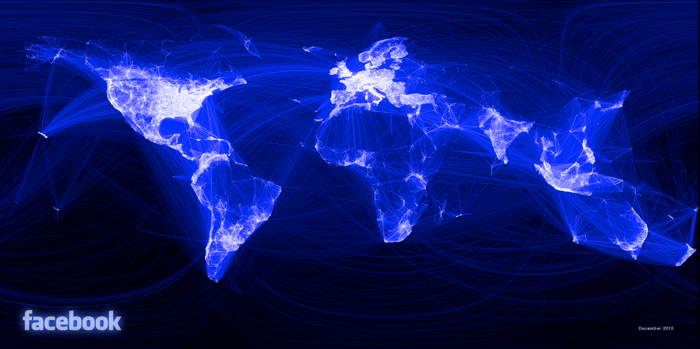
This map, created by Facebook, shows the connections people have made around the world. It is useful for charting who is connected and, just as important, who isn't (at least via Facebook, there is still a world outside of Facebook, or so I've been told).
A recent Pew survey looked at the world's appetite for social networking:
Among the 22 publics surveyed, Americans most often say they use websites like Facebook and MySpace: 46% use such sites, 36% use the internet, but do not access these sites, and 18% say they never go online.The survey finds three countries close behind the United States in social network usage: in Poland (43%), Britain (43%) and South Korea (40%), at least four-in-ten adults say they use such sites. And at least a third engage in social networking in France (36%), Spain (34%), Russia (33%) and Brazil (33%).1
Germans and the Japanese stand out among highly connected publics for their comparatively low levels of participation in social networking. While 31% of Germans use these types of sites, 49% go online at least occasionally but choose not to use them. In Japan, 24% are engaged in social networking, while 44% have internet access but are not engaged.
[Hat tip: William Easterly]
Two weeks ago I linked to a survey that found that most Americans didn't know how much money the federal government spent on foreign aid. According to Xavier Marquez, the same cannot be said for Europeans, who knew (in 1999 at least) with an "uncanny" degree of accuracy how much their governments devoted to foreign aid.
[Hat tip: Monkey Cage]
Robert Wright thinks the UN Security Council should create a Palestinian state:
The United Nations created a Jewish state six decades ago, and it can create a Palestinian state now. It can define the borders, set the timetable and lay down the rules for Palestinian elections (specifying, for example, that the winners must swear allegiance to a constitution that acknowledges Israel’s right to exist).Establishing such a state would involve more tricky issues than can be addressed in this space. (I take a stab at some of them at www.progressiverealist.org/UN2states.) But, however messy this solution may seem, it looks pretty good when you realize how hopeless the current process is.
It's worth remembering that while the UN may have recognized the division of British mandate territory, some of which was to become the state of Israel, it was Israeli arms that truly secured the country's existence and independence. A UN declaration of a Palestinian state today would be utterly toothless absent some ability to enforce the terms on both Israel and rejectionist elements among the Palestinians (and just Tuesday the leader of Hamas said in no uncertain terms that the group would "never recognize Israel"). Needless to say, that's simply not conceivable.
Leslie Gelb identifies the key issue in the administration's review of Afghan policy:
Nonetheless, America’s vital interests in Afghanistan were, once again, taken for granted. U.S. forces have to stay and do most of the fighting until the Taliban and al Qaeda are sufficiently weakened for Afghan troops to take over. But why? Why? Ten years ago, after the 9/11 attacks, Afghanistan was the center of the terrorist threat. Now, it’s one of many homes to terrorists, as was seen by the homegrown terrorist attack in Sweden this week. And the argument that success in Afghanistan is necessary to ward off catastrophe in Pakistan is even more specious. Pakistan will resist or fall to extremists because of what happens in Pakistan, a nation of 180 million people, not because of what happens in Afghanistan.
I would add that it's not only "specious" to make that argument about Pakistan, it's risible. Pakistan is aiding the Afghan insurgency. Pakistan is not worried about instability in Afghanistan leading to their downfall, they're worried about a stable, pro-Indian government taking shape in the country. The notion that we have to continue to fight in Afghanistan, against Pakistani-backed militants, to save Pakistan seems self-evidently absurd.
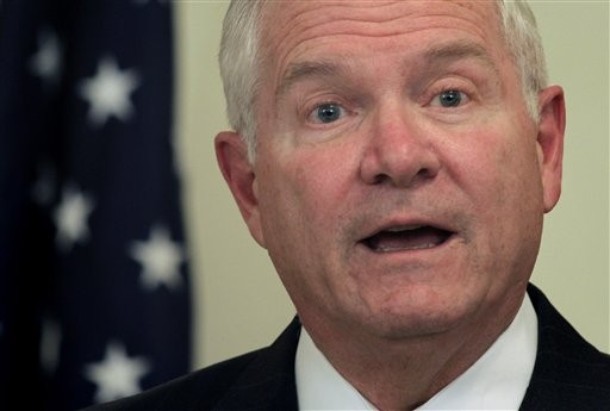
Kori Schake offers a hats off to Defense Secretary Robert Gates for his efforts on Afghanistan. After reading it, I came away a bit confused. It's clear that Schake thinks Gates is a skilled bureaucratic operator, and obviously any good policy needs skilled bureaucrats to shepherd it through the White House. But nowhere in the encomium is anything about how Gates strategy in the actual war in Afghanistan (not Washington) is faring.
The Gates strategy - to put in place a sustained surge of forces in Afghanistan until 2014 when the Afghans will be able to fight the Taliban on their own - has hardly been proven effective yet. By all means, credit Secretary Gates for seeing his preferred policy outcome prevail in the U.S. but it hasn't prevailed in Afghanistan yet. Nor is there much evidence to suggest that if it does, that the U.S. will commensurately safer from Islamic terrorism than had we pursued a less costly and ambitious plan.
(AP Photo)
According to the reinsurer Swiss Re, 2010 saw a tripling of monetary losses around the world due to disasters both man-made and natural:
According to initial estimates from Swiss Re’s sigma team, worldwide economic losses from natural catastrophes and man-made disasters were USD 222 billion in 2010, more than triple the 2009 figure of USD 63 billion. The cost to the global insurance industry was USD 36 billion, an increase of 34% over the previous year. Approximately 260 000 people died in these events, the highest number since 1976.In 2010, severe catastrophes claimed significantly more lives than the previous year: nearly 260,000 were killed, compared to 15,000 in 2009. The deadliest event in 2010 was the Haiti earthquake in January, claiming more than 222,000 lives. Approximately 15 000 people died during the summer heat wave in Russia. The summer floods in China and Pakistan also resulted in 6,225 deaths.
The German reinsurance firm Munich Re seconded this assessment, noting that 2010 had been an "exceptional" year for weather-related disasters.
Good times.
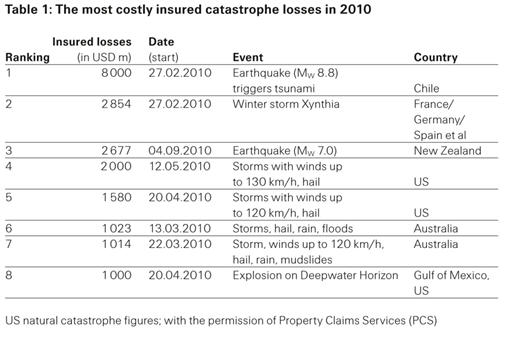
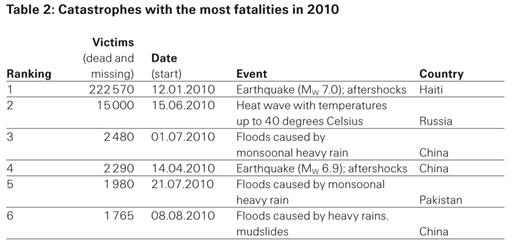

I've pointed out in the past the work of Robert Pape on how military occupations promote suicide terrorism, so I think it's worthwhile to point out that in his suicide note, the Swiss bomber Taimour al-Abdaly credited offensive cartoons as the reason he attempted to slaughter innocent Swedes out shopping for the holidays.
That doesn't mean the U.S. and the West shouldn't expect blow-back if it plunges military forces into the Middle East, but that there's more to the phenomena of suicide terrorism than attempts to drive infidels off of holy soil.
(AP Photo)
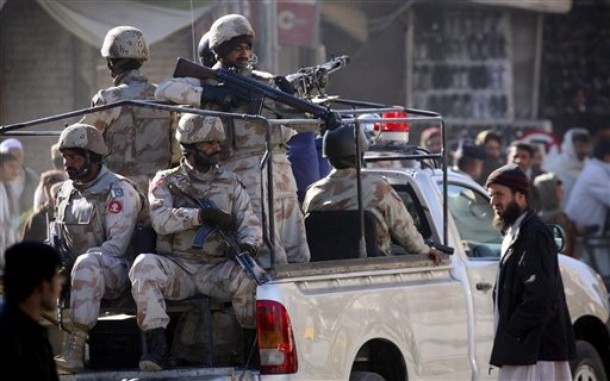
Max Boot says the president shouldn't listen to the "counsel of despair" coming from weak-willed elites. What I would like to know is how Boot and other proponents of staying the course in Afghanistan care to address this:
General Ashfaq Kiyani, Pakistan's army chief, has launched a diplomatic offensive to persuade the United States, Britain and President Karzai to back the deal which would offer government posts to Taliban leaders prepared to renounce al-Qaeda.It amounts to a direct challenge to Nato's current strategy to intensify the war against the Taliban-led insurgency in the hope of persuading its "reconcilable elements" to negotiate a peace.
Under General Kiyani's plan however, the insurgency's most feared faction, the "Haqqani Network" could play a role in a new 'broad-based government'.
Boot suggests that the Taliban will be more amenable to peace talks if Petraeus is given more time to bloody them and stabilize Afghanistan. But if Pakistan is sheltering and in some sense directing the insurgency, how can that plan possibly work? Giving Petreaus "more time" isn't suddenly going to change the geopolitics of the dispute or Pakistan's motivations for using Afghanistan as strategic depth against India.
(AP Photo)
WikiLeaks' latest dump was not without relevance to Malaysia - it includes a cable that deals with Anwar Ibrahim's much-discussed sodomy case (sodomy is illegal in Malaysia), with an opinion expressed within a conversation between Singapore and Australia. Excerpts here:
"The Australians said that Singapore's intelligence services and [Singaporean elder statesman] Lee Kuan Yew have told ONA in their exchanges that opposition leader Anwar 'did indeed commit the acts for which he is currently indicted'...The document says the Singaporeans told ONA they made this assessment on the basis of "technical intelligence", which is likely to relate to intercepted communications.
The ONA is also recorded as saying that Mr Anwar's political enemies engineered the circumstances from which the sodomy charges arose.
"ONA assessed, and their Singapore counterparts concurred, 'it was a set up job and he probably knew that, but walked into it anyway','' the cable states.
Emphasis mine. Anwar responded via Twitter, saying "Source? Polis SB Msia. Bukti tak ada. (The source? Malaysian police special branch. There's no proof of any such thing)." But now he's taken an additional step of filing a court appeal against the newspapers printing the story:
Anwar's lawyer Sankara Nair told AFP he will file a complaint with the court hearing Anwar's sodomy case over articles in the local media which could affect the former deputy premier's ongoing trial.
I think there's little question that Anwar's jailing in 1999 was mere persecution by prime minister Mahathir Mohamad -- that conviction was later overturned. When it comes to the more recent case, it's interesting at least that global intelligence services had an opinion that this did indeed take place, but was from its inception a "set up job."
Canada is supposed to shift to a "non-combat" role in Afghanistan in 2011, but according to Angus Reid, many Canadians are unhappy with the plan:
While just over a third of Canadians support the country’s military mission in Afghanistan, the decision to keep 950 soldiers in a strictly non-combat role after 2011 has split views across the country, a new Angus Reid Public Opinion poll has found.In the online survey of a representative national sample of 2,023 Canadian adults, more than half of respondents (56%) oppose the military operation involving Canadian soldiers in Afghanistan, while just over a third (36%) support the mission. Strong opposition to the war remains highest in Quebec (48%) while Albertans (19%) and Atlantic Canadians (18%) are more likely to strongly support the mission.
If given the opportunity to vote on the matter, 51% of Americans would ratify the START nuclear arms agreement with Russia and 30% would vote against it, while 19% are undecided.The partisan breakout is interesting because while Democrats are the leading proponents (56 would vote in favor vs. 28 voting against), Republicans weren't all that far behind: 49 percent would vote for ratification, 34 percent said they'd vote the treaty down.
The poll was conducted on December 3-6th.

Thomas Friedman says America should wash her hands of the peace process and cut aid to both the Israelis and Palestinians until they're ready to be serious about peace. Blake Hounshell says the U.S. can't just walk away:
But unfortunately, it's not so easy to just walk away. Not only has the United States given billions in military and economic aid to Israel over the last three decades -- and provided Israel diplomatic cover at the United Nations and other fora -- it has also propped up the Palestinian Authority while Arab leaders have broken promise after promise to help. U.S. bases dot the region, and U.S. troops are currently occupying two Muslim countries. American money goes to build settlements in the West Bank.
Seems like all the more reason to begin searching for another strategy. Hounshell argues that rather than pull back, the U.S. should double down and "propose" its own solution (and then what?) or do something really clever and unseat Netanyahu to put in the supposedly more pliable Livni. At which point, the Obama administration, Arab world, Palestinian Authority and Israel will make peace.
Sound plausible?
Of course it isn't. In fact, sustaining the peace process and America's broad and increasingly untenable definition of its interests in the Middle East is just as unrealistic as the notion that we can simply pull up stumps and leave tomorrow. I think even the most earnest proponent of "off-shore balancing" or non-interventionism understands that changes to American policy couldn't happen instantly. But there is a vital question of trajectory. For thirty years - since the Carter Doctrine - the U.S. has taken a path of deepening involvement in Middle Easttern affairs. It was a slow but steady accumulation of interests, military bases, commitments and a sense among Washington elites that concepts like "American prestige" had become inseparable from whether or not it could keep its arms wrapped around this unwieldy bundle.
In an era where the great power competition that compelled the Carter Doctrine is over and one in which America is menaced by a transnational radicalism, sustaining or even deepening our ownership of various Middle Eastern conflicts seems lethally counter-productive. That American commitments can't be unwound overnight is no argument against the proposition that we should at least get started.
(AP Photo)
This kind of speaks for itself.
(Don't miss our Year in Putin photo slideshow.)
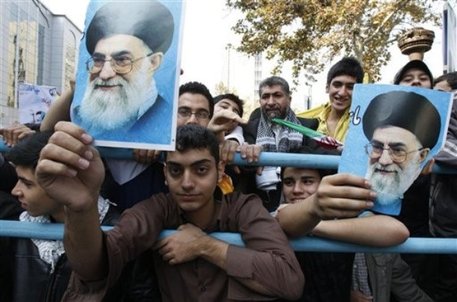
The war of words and deeds is heating up even further between President Mahmoud Ahmadinejad’s secular Chief of Staff Esfandiar Rahim Mashaei, who is rumored to be a presidential hopeful in 2013, and the mullahs wishing to sustain velayat-e faqih, or guardianship by the clerics, as the sole form of government in Iran.
Previously, Mashaei had criticized the clerics as incompetent politicians and tyrannical administrators who are out of touch with most Iranians. His website even called for their ouster. The mullahs in turn have labeled him a heretic and vowed to block his political ambitions.
Now Mashaei is taking on Supreme Leader Ayatollah Ali Khamenei directly.
Lately the Supreme Leader has been denouncing music – both Persian and Western – as unsuitable for the Islamic Republic:
"Teaching and encouraging music is not compatible with the highest values of the sacred system of the Islamic Republic."
Khamenei reportedly prefers prayer and revolutionary chants.
However, Iran’s increasingly independent youth are turning amass to music as a form of rebellion against the Islamic regime and embracing globalization.
The 50-year old Mashaei, who has increasingly been positioning himself as the champion of younger Iranians, ridiculed the Supreme Leader’s anti-music stance while addressing a gathering of artists in the city of Arak (Sultanabad):
When I speak frankly, they [the mullahs] call me a blasphemer. But many of them don’t understand music and so they claim music is religiously unacceptable. They pray so much … that they have become unaware of God. They see not God but an illusion … for they pray facing the wrong Kaaba [in the Grand mosque at Mecca] and so don't understand music either. They are incapable of comprehending the world of poetry and arts which is the pinnacle [of civilization]. Unlike them I am an engineer; consequently I understand the seabed of the arts.
Mashaei is already on record as claiming that those Iranians who focus on religion rather than science will never see heaven.
So despite Supreme Leader Khamenei's attempts at reconciliation between the warring factions of Iran’s ruling class, to preserve his own authority, the breakup continues apace at his expense.
(AP Photo)
A new Tumblr.
[Hat tip: Asia Sentinel]
Google has released an overview of "how the world searched" the Internet in 2010. They have a very neat interactive tool here that lets you monitor global search volumes by major world events, like the Haitian earthquake or World Cup. Check it out.
Pew Research released a survey on U.S. opinion of several hot-button foreign policy issues:
On another major pending issue before Congress, most Americans who have heard at least a little about the START treaty favor its ratification by the Senate: 54% favor ratification of the arms control treaty while 24% are opposed. Democrats and independents favor the treaty's ratification by wide margins, while Republicans are evenly split.And by greater than two-to-one (59% to 23%), the public favors allowing gays and lesbians to serve openly in the military....
On foreign policy, the public has become less optimistic that the U.S. will succeed in achieving its goals in Afghanistan. Only about half (49%) say the U.S. will definitely or probably succeed while 39% say it will definitely or probably fail. In June, 59% said success in Afghanistan was at least probable.
Support for maintaining U.S. and NATO forces in Afghanistan also has slipped since June. Currently, 44% favor keeping troops in Afghanistan until the situation has stabilized while 47% want to remove troops as soon as possible. In July, opinion also was divided, but in June 53% favored keeping U.S. and NATO troops in Afghanistan while 40% wanted them removed as soon as possible.
A new survey finds of Iranian opinion has a little something for everyone:
The majority of Iranians are in favor of their country having nuclear weapons, despite the fact that they are worried about international sanctions, according to a poll carried out by US-based Charney Research for the International Peace Institute.The poll found that 71 percent of Iranians want the country to have atomic weapons, a number that stood on only 52 percent in 2007. Forty-seven percent of respondents believed international sanctions on the Islamic Republic were having a major impact.
Also:
The poll found that, by a three-to-one majority, Iranians want closer ties to the West, not reduced links. They also support Western criticism of Iranian human rights violations and aid to Iranian nongovernmental organizations.
There's something in the poll to confirm that even a democratic Iran might not give up its nuclear weapons ambition and evidence that Iranians would welcome some Western assistance (although not to overthrow the current regime).

In the past I've noted with some skepticism whether there was a 'realist' case for the U.S.-Israeli alliance in its current form. But Stephen Walt, unintentionally, I think, actually makes one:
It is increasingly likely that a genuine two-state solution isn't going to be reached, and as I've noted before, the United States will be in a very awkward position once mainstream writers and politicians begin to recognize that fact. Once it becomes clear that "two states for two people" just ain't gonna happen, the United States will have to choose between backing a one-state, binational democracy, embracing ethnic cleansing, or supporting permanent apartheid. Those are the only alternatives to a two-state solution, and no future president will relish having to choose between them. But once the two-state solution is off the table, that is precisely the choice a future President would face.
Leave aside whether this characterization is accurate and focus instead on why a realist - of all people - should care. The United States supports states with far more egregious human rights records than anything sketched above. A realist is supposed to give less weight to a state's internal flaws and focus instead on its geopolitical orientation, right?
Update: Larison demurs:
...I would say that a realist wouldn’t worry as much about Israel’s “internal flaws” if they were simply internal. We have other allies that still occupy territory seized during wartime decades ago, but the rest of them are not client states to the same degree that Israel is and the rest of them do not receive such generous aid. It is because of the extent of the relationship and the complications it creates for the U.S. with most other countries in the region that the realist cares about the implications for U.S. interests if the two-state solution is indeed beyond saving.It is also the realist’s concern that much of the rest of the world claims to see the resolution of this conflict as a high priority, and it is the realist’s concern that much of the rest of the world focuses, fairly or not, on Israel’s conduct in the occupied territories more than it does on the worse internal repressions of numerous dictatorships. My preference would be to acknowledge that both the Israeli-Palestinian conflict and the U.S.-Israel relationship are vastly less strategically important than most people claim that they are, but a realist has to work with the world as it is rather than how one would like it to be.
(AP Photo)
Ibrahim al-Sumaidaie explains:
"With the rising pressure of the international community and increase of sanctions and hints of military actions against Iran, the near future will witness a rise for the Turkish role," he said."The Turkish role has the blessing of the international community and is backed by Arab countries. It has not met any Iraqi objection, as happened with the Saudis, who faced objections from the Shi'ites, or with the Iranians, who faced objections from the Sunnis," he said.
Angus Reid surveys public opinion in the U.S., Canada and Britain on WikiLeaks:
Half of Americans (51%) believe WikiLeaks as wrong to publish tens of thousands of classified U.S. diplomatic cables, while one-in-five (19%) agree with its actions.The views of respondents in the other two countries are definitely more nuanced. In Canada, 36 per cent of respondents say WikiLeaks was wrong, while 30 per cent claim it was right. Britain posts very similar numbers, with 38 per cent of respondents stating that WikiLeaks was wrong, and 33 per cent saying it was right.
At least three-in-five respondents in the three countries believe the release of these documents will damage diplomatic relations between the U.S. and other countries (BRI 65%, CAN 61%, USA 60%) and majorities also state that the release of these documents will make it harder for the U.S. to advance its foreign policy goals (BRI 60%, USA 59%, CAN 57%). However, while three-in-five Americans (62%) fear that the WikiLeaks release will put people’s lives at risk, including U.S. diplomats and soldiers, this view is shared by about half of Britons (51%) and Canadians (48%).
I have been posting about the close ties between Iran and Venezuela for years now, and last month Welt Online published this report,
"Achse Caracas–Teheran
Iran plant Bau einer Raketenstellung in Venezuela" ("Caracas-Tehran Axis: Iran plans to build a missile base in Venezuela." You can read the Google translation here).
The article refers to an agreement signed on October 19 this year:
According to information received by Welt on Line, Iran's Supreme Security Council had proposed a joint military facility on Venezuelan soil to increase the deterrent power of Iran against the West. The cooperation would be a way for Iran to build a strategic base in South American - in the backyard of the United States.
Barack Obama, coincidentally, has already stated that a nuclear-powered Venezuela is fine by him.
Anna Mahjar-Barducci at Hudson New York has more on the Iran-Venezuela missile agreement,
Iran Placing Medium-Range Missiles in Venezuela; Can Reach the U.S.:
At a moment when NATO members found an agreement, in the recent Lisbon summit (19-20 November 2010), to develop a Missile Defence capability to protect NATO's populations and territories in Europe against ballistic missile attacks from the East (namely, Iran), Iran's counter-move consists in establishing a strategic base in the South American continent - in the United States's soft underbelly.According to Die Welt, Venezuela has agreed to allow Iran to establish a military base manned by Iranian missile officers, soldiers of the Iranian Revolutionary Guard and Venezuelan missile officers. In addition, Iran has given permission for the missiles to be used in case of an "emergency". In return, the agreement states that Venezuela can use these facilities for "national needs" – radically increasing the threat to neighbors like Colombia. The German daily claims that according to the agreement, Iranian Shahab 3 (range 1300-1500 km), Scud-B (285-330 km) and Scud-C (300, 500 and 700 km) will be deployed in the proposed base. It says that Iran also pledged to help Venezuela in rocket technology expertise, including intensive training of officers.
Of course, considering the flights between Iran and Venezuela, Iranian personnel may be manning the technology in Venezuela.
Back in 2008, Italian daily La Stampa and AFP reported about Iran's use of Venezuela to bypass UN sanctions. This strategy continues:
Venezuela has also become the country through which Iran intends to bypass UN sanctions. Following a new round of UN sanctions against the Islamic Republic, for example, Russia decided not to sell five battalions of S-300PMU-1 air defence systems to Iran. These weapons, along with a number of other weapons, were part of a deal, signed in 2007, worth $800 million. Now that these weapons cannot be delivered to Iran, Russia is looking for new customers; according to the Russian press agency Novosti[2], it found one: Venezuela.Novosti reports the words of Igor Korotchenko, head of a Moscow-based think tank on international arms trade, saying that if the S-300 deal with Venezuela goes through, Caracas should pay cash for the missiles, rather than take another loan from Russia. "The S-300 is a very good product and Venezuela should pay the full amount in cash, as the country's budget has enough funds to cover the deal ," Korotchenko said. Moscow has already provided Caracas with several loans to buy Russian-made weaponry, including a recent $2.2-mln loan on the purchase of 92 T-72M1M tanks, the Smerch multiple-launch rocket systems and other military equipment.
If Iran, therefore, cannot get the S-300 missiles directly from Russia, it can still have them through its proxy, Venezuela, and deploy them against its staunchest enemy, the U.S..
And Iran may have the missile technology:
According to Reuters, Iran has developed a version of the Russian S-300 missile and will test-fire it soon, as declared by the official news agency IRNA, two months after Moscow canceled the delivery to comply with United Nations sanctions[3]. Iran, in fact, has its own capabilities for constructing missiles that could carry atomic warheads. According to a study recently released by the International Institute of Strategic Studies in London, Iran is presently aiming to perfect the already existing solid-fuel, medium-range missile that can carry a nuke to hit regional targets, such as Israel[4]. If a missile base can be opened in Venezuela, many US cities will be able to be reached from there even with short-medium range missiles.
The Hudson article goes on to say that the Obama administration has a lax attitude. Don't I wish the attitude was "lax"; as you can see from the link above, Obama's given his blessing to a nuclear Venezuela.
The deadline on this? According to the Welt article, "both sides want to start building the project's infrastructure by 2011."
Cross-posted at Fausta's blog.
So says Transparency International in a new poll:
Corruption has increased over the last three years, say six out of 10 people around the world. One in four people report paying bribes in the last year. These are the findings of the 2010 Global Corruption Barometer.Views on corruption were most negative in Western Europe and North America, where 73 per cent and 67 per cent of people respectively thought corruption had increased over the last three years.
You can view an interactive presentation of the results here.
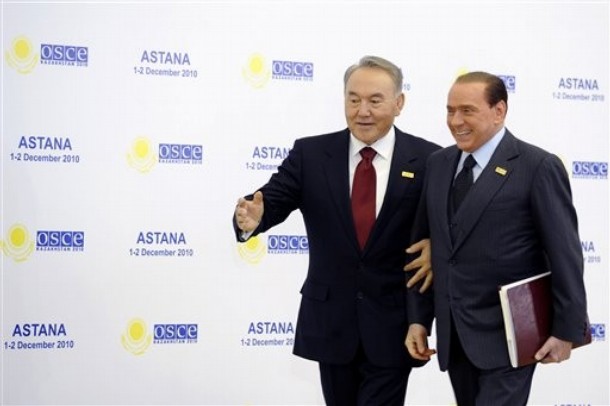
Joseph Hammond reports that Kazakhstan's President for Life wants an extended term:
[Nursultan] Nazarbaev has repeatedly used his post as president to call for renewed research into medical immortality, most recently in a speech to students marking the opening of Nazarbaev University in Astana.Nazarbaev spoke of the need for research on a number of topics: "rejuvenation of the organism…the human genome...production of human tissue...the creation of gene-based medicines."
“As for the medicine of the future, people of my age are really hoping all of this will happen as soon as possible," Nazarbaev quipped.
(AP Photo)
Victor Cha writes on the strategic logic of war in Korea:
There is a real possibility of war on the Korean Peninsula. The cause is not a second North Korean invasion of the South like in June 1950, which was successfully deterred by U.S. and South Korean forces. The danger stems from two combustible trends: A North Korea which mistakenly believes it is invulnerable to retaliation due to its nascent nuclear capabilities, and a South Korea that feels increasingly compelled to react with military force to the string of ever more brash provocations like the artillery barrage on Yeonpyeong Island.
This is sober analysis. Joshua Stanton, an expert on the peninsula and former editor of the Military Law Review, agrees and disagrees:
If anything, I think Cha understates the gravity of the situation. North Korea — by the way, it was removed from the list of state sponsors of terrorism on October 11, 2008 — has already sunk a South Korean warship, shelled a South Korean island, killed and maimed Marines and civilians, and turned the survivors of the impact zone into South Korea’s first population of war refugees since 1953. How is that not already war — even if it’s still unilateral and limited? Yet with each provocation, another limit is crossed. Cha is also right that South Korea has an urgent need for a way to deter the next escalation, which might be as unthinkable as the last ones still seem.
And yet:
Which brings us to where Cha gets it wrong. Notwithstanding this persuasive deconstruction of conventional deterrence, he still argues that we can only restore it by flooding South Korea with American targets soldiers (long ago, I was one of them). Then, almost as an afterthought, Cha argues that we seek the permission of the spineless Ban Ki Moon and the duplicitous Hu Jintao to do what Article 51 of the U.N. Charter clearly authorizes anyway. But this is a fool’s errand. I think Victor Cha is an honest, decent, and intelligent man, but here, he seems to personify a foreign policy establishment that wasted so many precious years leaning on the only two policies it ever seems to have thought of — conventional military deterrence, which North Korea has clearly circumvented; and diplomatic appeasement, which North Korea has so profitably exploited.
Stanton described at length several other deterrence strategies for the United States in a recent podcast he recorded for Coffee & Markets, the daily podcast I co-host along with Brad Jackson. You can listen to the interview with Stanton here, and read more at his indispensable website on Korea.
Via Angus Reid, a new survey on U.S. views on the Afghan war:
Americans remain divided on their country’s military deployment in Afghanistan, and almost half erroneously assume that more than 2,000 U.S. soldiers have lost their lives in the conflict, a new Angus Reid Public Opinion poll has found....The proportion of people in the United States who think that engaging the military in Afghanistan was a mistake stands at 38 per cent, six points higher than in April and June. Two-in-five Americans (40%, +3) believe that that the U.S. did the right thing in sending soldiers to Afghanistan.
More than half of respondents (54%, +3) claim that they do not know what war in Afghanistan is all about, whereas 46 per cent (-3) say they do.
See the full results here.
Pew Research highlights this surveys Muslim publics for their views on Hezbollah, Hamas and al-Qaeda:

It's worth noting here that Turkey is the least receptive to these groups. In a later question from Pew, on the whether Islam in politics is a good or bad thing, Turks had the lowest percent of respondents (45 percent) suggesting it was a good thing.
Foreign affairs and his handling of Afghanistan remain his (relative) strong points, according to Gallup:
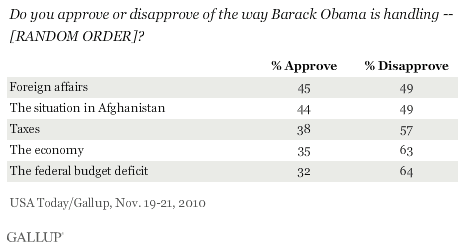
Robert Kaplan pens an ode to what he sees as a fading American Imperium:
If the Cold War was an epoch of relative stability, guaranteed by a tacit understanding among empires, we now have one waning empire, that of the United States, trying to bring order amid a world of rising and sometimes hostile powers.
It's a useful conceit to pretend that the Cold War was an era of global stability, but unless we're defining 'stability' as the absence of a war between U.S. and Russia, the Cold War was anything but stable. China fought a war against India and had serious border skirmishes with Moscow. India fought several wars against Pakistan. Two civil wars - one in Korea and one in Vietnam - drew in the United States at the cost of 100,000 American lives and scores more wounded. Tens of millions of people died during Mao's reign of terror. Iran and Iraq fought a war which claimed about one million lives. Israel, too, fought several wars and Lebanon was ripped apart by a civil war (which also drew the U.S. in briefly, with disastrous results).
There is every reason to worry about instability and the potential for violence around the world today. But it has always been thus. America helped stabilize and secure Europe and portions of Asia because the societies it was protecting had been utterly shattered and broken and had no one else to turn to besides the Soviet Union - an unappealing option. But even in Europe there was terrorism, and around the world there was a pervasive worry about subversive Soviet efforts.
Today's international environment, as Kaplan eludes to, is quite different. American power is waning in large part because other powers are growing. That is a combustible mix, to be sure, and it might presage a more violent age than the one that past. But trying to sustain a Cold War sense of imperial mission is not going to fix that, and it would likely lead the U.S. into future costly conflicts that would only serve to hasten her relative decline. In fact, I suspect much of what lies behind this Cold War nostalgia is a pining for an intellectual coherence to American strategy that has been largely missing since the Soviet Union collapsed.

The Economist's B.G. weighs in:
My gripe against Mr Assange is that he takes advantage of the protections of liberal democracies, but refuses to submit himself to them. If he wants to use the libel protections guaranteed by New York State, then he should live in New York, and commit himself to all of the safety and consequences of America's constitution. If he wants to use Sweden's whistleblower laws, then he should return to Sweden and let its justice system take its course. This, as we've written in the paper, is what distinguishes Mr Assange from Daniel Ellsberg. Mr Ellsberg did not flee America after releasing the Pentagon Papers; he stayed here and stood trial. Regardless of what you think about Mr Ellsberg's motives, he followed the basic tenets of civil disobedience: break a law, then publicly accept the consequences. Mr Assange just protects himself.Julian Assange has created a legal structure that allows him to answer only to his own conscience. This is an extraordinarily clever hack of the world's legal systems. But it makes his pretense at moral authority a little hard to take seriously.
(AP Photo)
It's not unusual for conservatives to lambaste Putin's Russia for its authoritarian backsliding. Just today, Jamie Fly excoriates the Obama administration's New START treaty on the grounds that, among other things, we really should be pressing Russia on human rights instead. So naturally, conservatives were horrified when authoritarian Russia made a not so subtle threat at WikiLeaks:
So far Russia has had no official response. But on Wednesday, an official at the Center for Information Security of the FSB, Russia’s secret police, gave a warning to WikiLeaks that showed none of the tact of the U.S. reply to the Iraq revelations. “It’s essential to remember that given the will and the relevant orders, [WikiLeaks] can be made inaccessible forever,” the anonymous official told the independent Russian news website LifeNews.
An outrage! Take it away, Charles Krauthammer:
We are at war - a hot war in Afghanistan where six Americans were killed just this past Monday, and a shadowy world war where enemies from Yemen to Portland, Ore., are planning holy terror. Franklin Roosevelt had German saboteurs tried by military tribunal and executed. Assange has done more damage to the United States than all six of those Germans combined. Putting U.S. secrets on the Internet, a medium of universal dissemination new in human history, requires a reconceptualization of sabotage and espionage - and the laws to punish and prevent them. Where is the Justice Department?And where are the intelligence agencies on which we lavish $80 billion a year? Assange has gone missing. Well, he's no cave-dwelling jihadi ascetic. Find him. Start with every five-star hotel in England and work your way down.
Want to prevent this from happening again? Let the world see a man who can't sleep in the same bed on consecutive nights, who fears the long arm of American justice. I'm not advocating that we bring out of retirement the KGB proxy who, on a London street, killed a Bulgarian dissident with a poisoned umbrella tip. But it would be nice if people like Assange were made to worry every time they go out in the rain.
So is this what we mean by American exceptionalism: being a tad less ruthless than the KGB?
The United States will agree to a demand by Kyrgyz officials that their impoverished country be given a share of lucrative fuel contracts for a critical transit hub here for troops headed to Afghanistan, Secretary of State Hillary Rodham Clinton said Thursday.Clinton's announcement, made during a five-hour visit to the fragile Central Asian democracy, appeared designed to assuage growing anger over Pentagon contracts that have been worth about $3 billion over eight years to Mina Corp. and Red Star Enterprises, a secretive business group registered in Gibraltar.
The new arrangement should also please Russia, which is expected to play a big - and profitable - role. Gazpromneft, part of Russia's state-controlled energy giant Gazprom, will probably supply much of the jet fuel.
Moscow has frequently used Gazprom to further its political and strategic goals, but the Obama administration is gambling that its efforts to "reset" relations with Russia - and the prospect of large profits for Gazprom - will help ensure that jet fuel keeps flowing to the U.S. air base in Kyrgyzstan, known as the Manas Transit Center. - Washington Post
Now the specifics of this seem rather pragmatic - if everyone gets to wet their whistle, no one complains. But it's worth pondering the contortions that U.S. policy must endure all so that we can stop under 100 al-Qaeda fighters from maybe someday crossing into Afghanistan.
The Army is deploying its new XM-25 a "smart rifle" in its efforts to pare back the Taliban insurgency:
The Pentagon has rolled out prototypes of its first-ever programmable "smart" grenade launcher, a shoulder-fired weapon that uses microchipped ammunition to target and kill the enemy, even when the enemy is hidden behind walls or other cover....The gun fires 25mm air-bursting shells up to 2,300 feet, well past the range of most rifles used by today's soldiers, and programs them to explode at a precise distance, allowing troops to neutralise insurgents hiding behind walls, rocks or trenches or inside buildings.
The Army is calling it a "game changer" which is unlikely given that killing the Taliban is something we've been good at for quite some time, with little impact on Afghanistan's overall stability and coherence.
A cool visualization of life expectancy and income growth in 200 countries over a 200 year period.
[Hat tip: TPM]
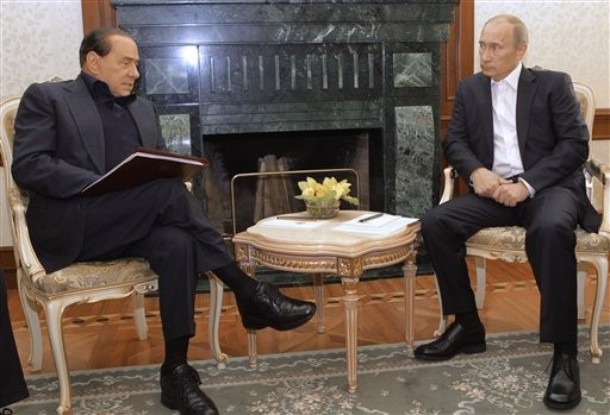
Arms Control Wonk Jeffrey Lewis digs around WikiLeaks and finds evidence that Italy, to his surprise, had pushed to have the U.S. remove tactical nuclear weapons from its territory:
As regular readers know, I have long supported the immediate consolidation of all US nuclear weapons in Europe to two US airbases — with Incirlik and Aviano being the obvious candidates. The surprise announcement that Italy wants the bombs gone too modestly complicates that proposal, although presumably Rome would welcome the withdrawal of nuclear weapons from Ghedi Torre.Does anyone know why the Berlusconi government might have shifted its position on forward deployed US nuclear weapons? Is it a function of some inexplicable Italian coalition politics?
A possible answer, I think, comes from another revelation in the WikiLeaks trove:
The official report that Mr Berlusconi “and his cronies” have been enabled to make money on multi-million pound energy deals concluded between Italy and Russia. Aside from alleged financial deals, the two leaders’ close ties were founded on Mr Berlusconi’s admiration of “Putin’s macho, decisive and authoritarian governing style,” the then US ambassador to Rome, Ronald Spogli, wrote in Jan 2009.
According to a new survey from World Public Opinion, most Americans don't know how much of the federal budget goes to foreign aid:
Asked to estimate how much of the federal budget goes to foreign aid the median estimate is 25 percent. Asked how much they thought would be an "appropriate" percentage the median response is 10 percent.In fact just 1 percent of the federal budget goes to foreign aid. Even if one only includes the discretionary part of the federal budget, foreign aid represents only 2.6 percent.
Pew Research's Andrew Kohut claims Americans are tuned out to foreign policy:
It is hard to recall a time when foreign policy issues played so diminished a role in the American public's thinking. Midterm election exit polls found only 8 percent of voters saying that a foreign policy issue was a voting consideration for them, and more generally, national polls show just 11 percent citing a foreign policy issue as the most important problem facing the nation. This is the lowest registration of international concerns since immediately before the 9/11 attacks.
Our latest Gallup/RCW top five list looks at the countries who most approve of India's leadership. While the top five countries are clustered in Africa, Afghanistan comes in at number 6 (not in our survey but in the full Gallup survey on India here). It's not surprising, given the nearly $1.2 billion in aid that India has provided to the country after the U.S. invasion, but it is a reminder of why Pakistan, despite being on the receiving end of even more American generosity, is consistently undermining U.S. goals in Afghanistan.
Courtesy of AP: "Brazilian clown allowed to go to Congress."
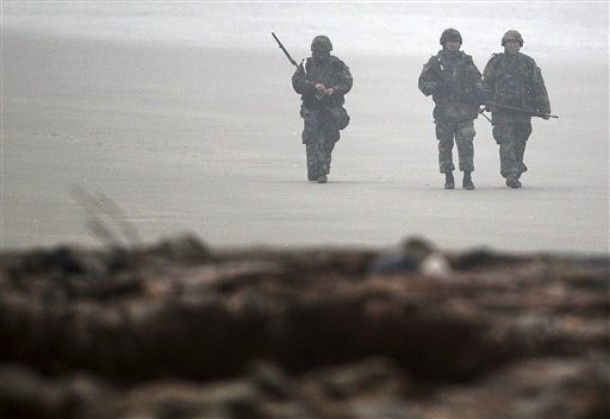
According to a new poll from Angus Reid:
More than two thirds of Americans expect armed conflict to break out in the Korean Peninsula over the next year and more than half are in favor of allowing U.S. soldiers to provide assistance to South Korea, a new Angus Reid Public Opinion poll has found....More than half of Americans (53%, +6 since August) would support American soldiers providing assistance to South Korea in the event of a war against North Korea, while three-in-ten (31%) disagree with this course of action. Republicans (71%) are more likely than Independents (54%) and Democrats (46%) to endorse this notion.
Respondents are almost evenly divided on whether the U.S. Government should authorize a military invasion of North Korea with the aim of removing the North Korean Government, if a war breaks out in the Korean Peninsula. While 38 per cent of respondents are in favor of an invasion, 41 per cent are opposed. More than half of Republicans (53%) are ready to endorse an incursion in this particular scenario, but only 37 per cent of Independents and 34 per cent of Democrats concur.
An earlier survey from Rasmussen found that 46 percent of Americans would support South Korea militarily in the event of a war, and 33 percent supported sending additional American troops to the peninsula in the event South Korea was attacked.
(AP Photo)

Thomas Friedman asks what it would look like if WikiLeaks poached China's secrets. He does it to set up a faux cable highlighting America's domestic shortcoming, but it's a question I had been asking myself after reading Glenn Greenwald's defense of the organization:
Ultimately, WikiLeaks' real goal appears to me to be anti-authoritarian at its core: to prevent the world's most powerful factions from operating in the dark.
So has WikiLeaks targeted authoritarian powers like China or Russia? The WikiLeaks Wikipedia page says that one of its founders was a Chinese dissident so it's possible they've been poaching secrets from China, Russia and other authoritarian powers, but clearly not with the intensity that they've gone after the U.S. Or maybe they just have not had the good fortune (in their view) to hook up with the Chinese or Russian equivalent of a Bradley Manning, the alleged source of their U.S. material. But this just belies Greenwald's assertion about the organization's "anti-authoritarian" posture - real authoritarian states don't cough up their secrets that easily and truly "anti-authoritarian" organizations just don't scoop up the low-hanging fruit from flawed democracies and call it a day.
Then again, it's not clear that Greenwald has an accurate sense of international media freedom. He writes in a different post on WikiLeaks:
Simply put, there are few countries in the world with citizenries and especially media outlets more devoted to serving, protecting and venerating government authorities than the U.S.
Obviously this is just hyperbole. But still:
Of the 196 countries and territories assessed during calendar year 2009, 69 (35 percent) were rated Free, 64 (33 percent) were rated Partly Free, and 63 (32 percent) were rated Not Free. This represents a move toward the center compared with the survey covering 2008, which featured 70 Free, 61 Partly Free, and 64 Not Free countries and territories.The survey found that only 16 percent of the world’s inhabitants live in countries with a Free press, while 44 percent have a Partly Free press and 40 percent live in Not Free environments.
The U.S. media can be servile, corrupt and biased but the idea that there are few other countries in the world whose media is more subservient to government power than America ignores a rather huge swath of world media that is actually run by the state.
(AP Photo)
The Brookings Institution has kicked off an interesting project measuring the economic performance of the 150 largest metro areas in the world before and after the Great Recession. You can read the full report here. (pdf)
The cities that have performed the best during the recovery of 2009-2010 are:
1. Istanbul
2. Shenzhen
3. Lima
4. Singapore
5. Santiago
The first U.S. city to make the list is Austin at 26th.